Historical Milestones
Historical Milestones
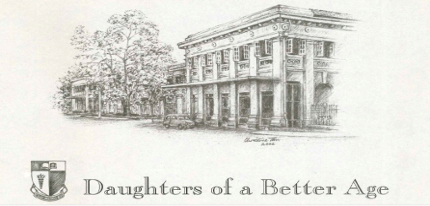
Established in 1879, Raffles Girls’ School (RGS) is today a leading girls’ school providing a holistic education via its six-year Raffles Programme.
The growth of RGS is largely attributed to the commitment of individuals who were passionate about the education of girls in an era when the provision of academic education for girls was considered unimportant.
RGS’ humble beginnings can be traced to a group of eight ladies who were determined to rescue orphans and very poor girls from vice and provide them with care and protection through education. Their efforts to set up a girls’ school attached to the Singapore Institution (later renamed Raffles Institution) were supported by Mrs Elizabeth Cavenagh (nee Moriarty), wife of the Straits Settlements Governor, who became the School’s Patron. It was their labour and dedication that enabled RGS to make steady progress in student enrolment, paving the way for its status as a distinguished educational institution in Singapore. The commitment of good people, many of whom remain unsung heroes, continues to shape RGS as an institution for high-ability girls.
1879
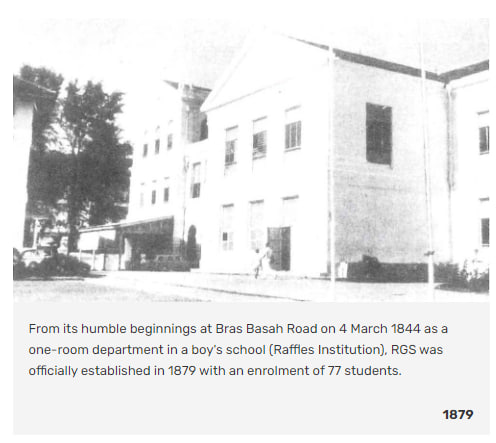
From its humble beginnings at Bras Basah Road on 4 March 1844 as a one-room department in a boy’s school (Raffles Institution), RGS was officially established in 1879 with an enrolment of 77 students.
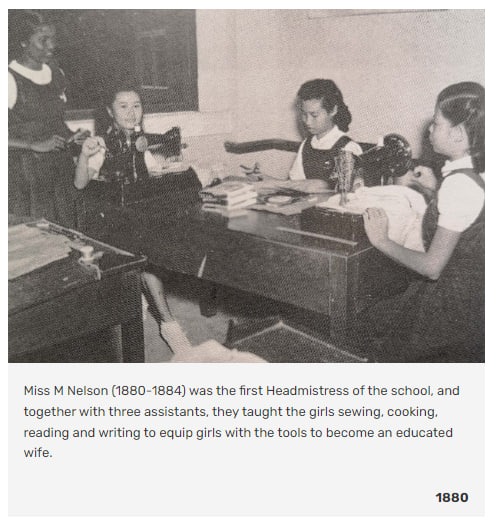
Its first Headmistress was Miss M Nelson (1880 – 1884). Together with three assistants, Miss Nelson taught the girls sewing, cooking, reading and writing as the focus of the school then was to equip girls with the tools to become an educated wife.
1882
From 1882 onwards, English speaking boys were admitted to the lower, middle and primary classes. This was discontinued in 1927 due to the increasing demand for places for girls. The school had by 1883, 4 classrooms, occupied by 134 students
1900
RGS attained the status of an English High School, offering Latin as a subject which proved useful to girls aspiring to become doctors and lawyers.
In 1902, the Director of Public Instruction referred to RGS as “an admirably managed establishment”.
1903
RGS became a Government School – henceforth the Government set the standard of education and appointed civil servants to run the School.
Principal Miss Tarbet (1904 – 1910) pushed for the start of a training establishment where students could be trained to be teachers.
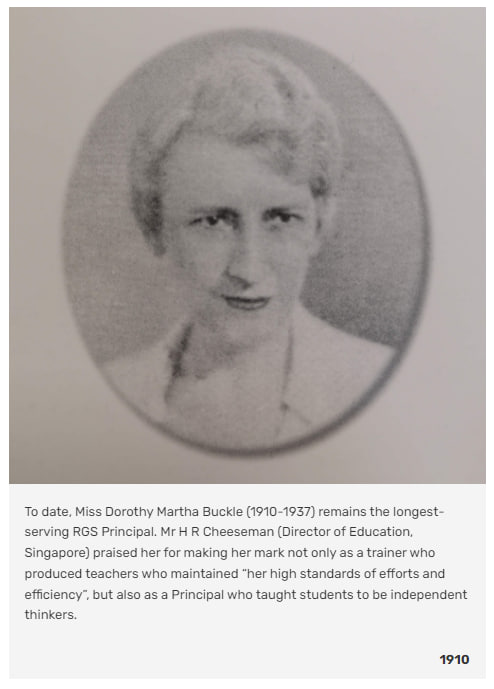
To date, Miss Dorothy Martha Buckle (1910 – 1937) is the longest serving Principal in RGS. Mr H R Cheeseman (Director of Education, Singapore) praised her for making her mark not only as a trainer who produced teachers who maintained “her high standards of efforts and of efficiency”, but also as a Principal who taught students to be independent thinkers.
1928
As enrolment expanded, RGS moved to Queen Street in 1928 whereupon it became a full-fledged girls’ school and stopped admitting boys to the lower and middle forms.
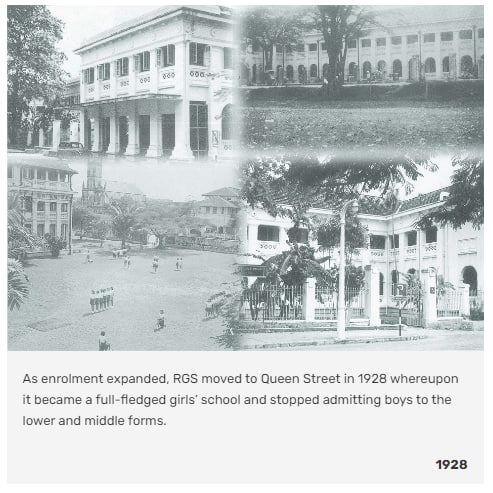
Principal Miss C Richardson (1938 – 1939) was known for her efforts in impressing on students the importance of articulating the English Language properly and her emphasis on discipline.
When World War Two broke out, Principal Mrs K Waddle (1939 – 1942) chose to remain in Singapore out of dedication to her job. When she left on the last evacuation boat just before the Japanese occupied Singapore, the boat was torpedoed and she lost her life at sea.
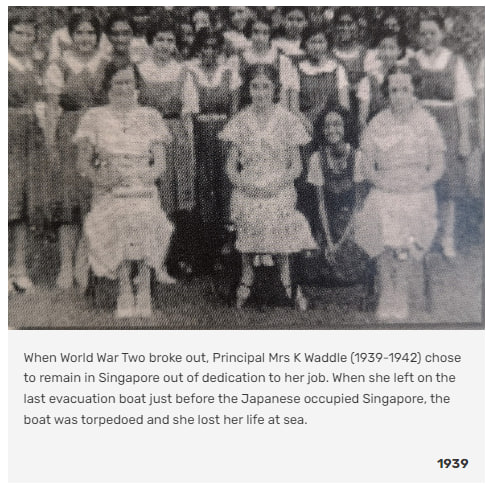
1942-45
RGS’ Queen Street campus was occupied by the Japanese Military Police (“Kempeitai”) as its headquarters during the war years.
1946
The House system in RGS was started by Miss M M Hadley, the postwar principal of the school (1946 - 1951), to develop in RGS students a strong sense of belonging to the school.
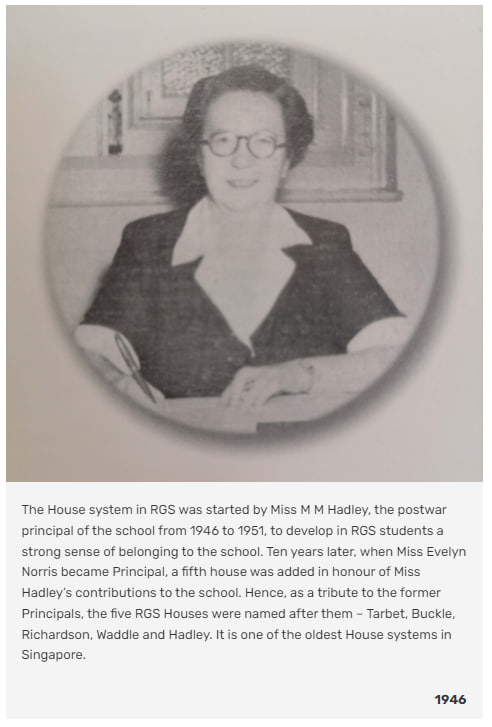
Ten years later when Miss Evelyn Norris became Principal, she added a fifth house – Hadley House - in honour of Miss Hadley’s contributions to the school. Hence, as a tribute to the former Principals, the five RGS Houses were named after them. It is one of the oldest House systems in Singapore.
1950
Principal Miss Cecily Hinchliffe (1951 – 1956) championed all-round development of students. A Science Department was established in 1955 and a laboratory completed in 1957. She also introduced weekly assemblies to the school programme, which have since become part of the school’s tradition.
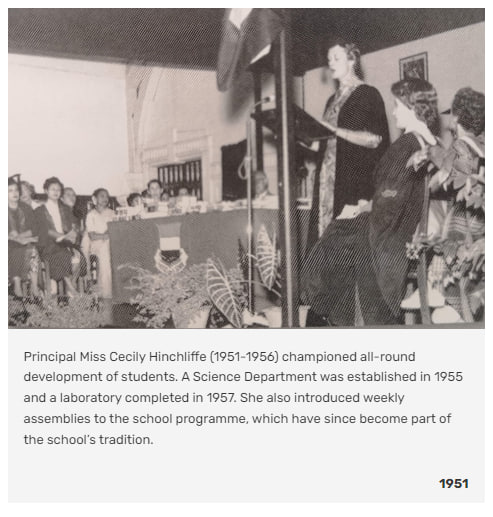
The school motto (“Filiae Melioris Aevi” or “Daughters of a Better Age”) was introduced in 1953, with the school's first annual Speech Day held on the same year.
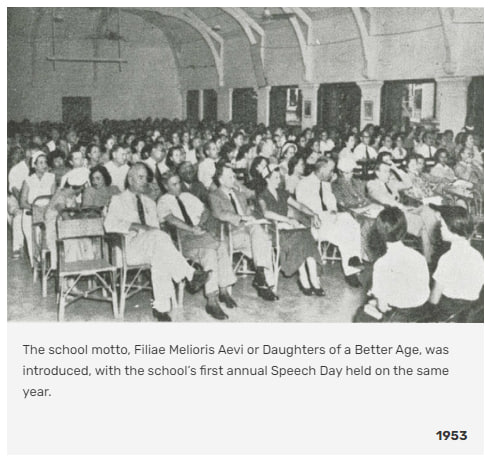
The following year, in 1954, “From High Olympus” was adopted as the school song (lyrics and music by Miss Florence Hoare and Miss H L Schnoor).
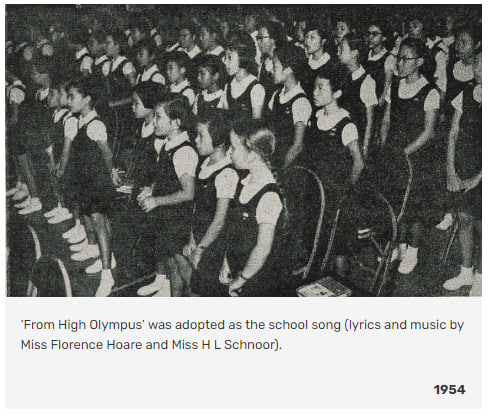
1959
In January 1959, the primary and secondary sections of the school were separated and the secondary section moved to Anderson Road, while the primary section was renamed Raffles Girls' Primary School (RGPS) and remained in Queen Street till 1979 when it too moved to larger premises on Holland Grove Road.
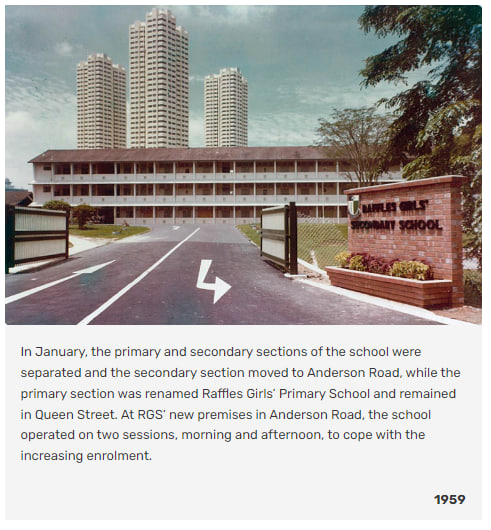
At the school’s new premises in Anderson Road, the school operated on “two sessions” (morning and afternoon) to cope with increasing enrolment.
Principal Miss M N Oehlers (1958 – 1961) oversaw the move. She had been a student, a teacher and Assistant Principal before taking over the helm as Principal of RGS. At her retirement ceremony in 1961, she outlined what she regarded as important qualities to develop in students: Honesty, Courtesy and Charity.
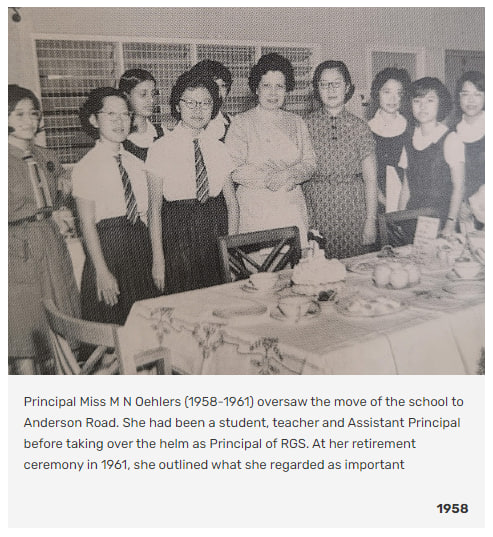
1961
Principal Miss Noel Evelyn Norris (1961 – 1976) encouraged leadership training and character development for girls, and avidly promoted CCAs. She also made it compulsory for students to read both Science and Arts subjects so as to have an all-rounded education.
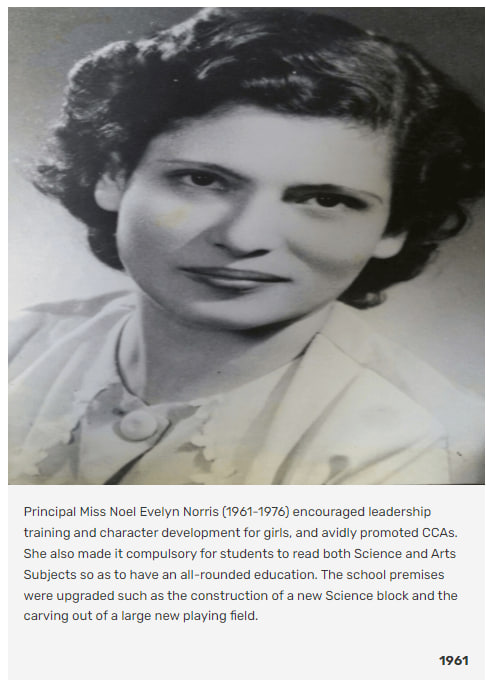
The school premises were upgraded such as the construction of a new Science block and the carving out of a large new playing field.
1977
Principal Miss Tan Leng Neo (1977 – 1979) oversaw both the Secondary and Pre-University classes at RGS. Believing that students absorb more through experiential learning, she encouraged teachers to organize field trips and outdoor activities for students.
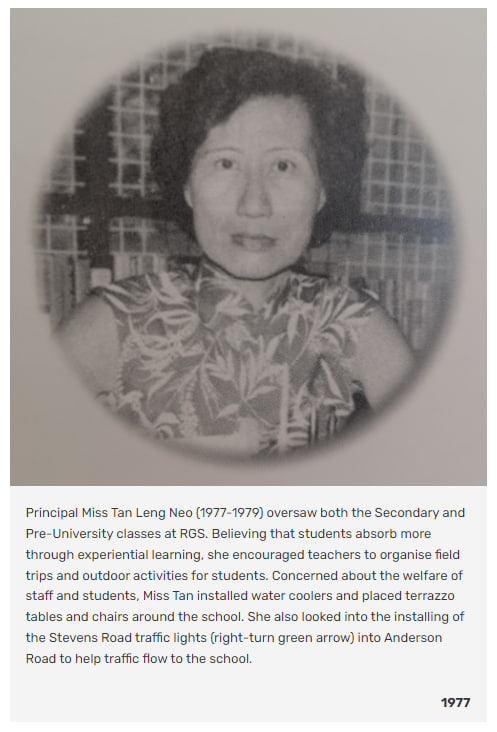
A multi-purpose parade ground was constructed to provide a suitable assembly area for flag-raising ceremonies as well as for uniformed groups to form up. The parade square also serves as a venue for special celebrations like Founder’s Day, Speech Day, National Day and Teacher’s Day. This parade ground was renamed Tan Leng Neo Square in her honour in 2001.
Concerned about the welfare of staff and students, Miss Tan installed water coolers and placed terrazzo tables and chairs around the school. She also looked into the installing of the Steven’s Road traffic lights “right-turn green arrow” into Anderson Road to help traffic flow to the school.
1980
Principal Mrs Chee Keng Soon (1980 – 1988) introduced job attachments, talks and other activities outside of school for character and leadership development. To inculcate in students a concern for the less fortunate, classes were encouraged to visit welfare organisations.
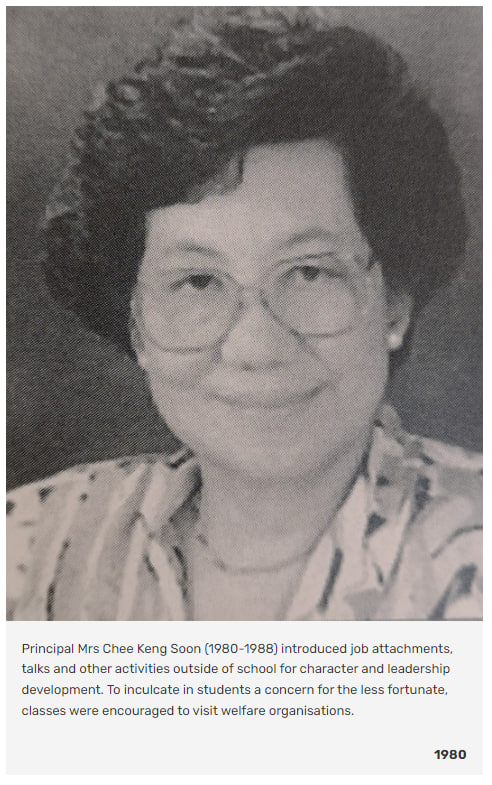
To ease constraints on school facilities, the Pre-University classes were phased out in 1983. In 1984, the Gifted Education Programme was introduced. A year later, RGS went single session when the school was given the use of the adjoining ex-Anderson Secondary School campus.
Students enjoyed ample opportunities to showcase their creative talents in music, drama, art and languages when “RGS Nite” (originally known as “An Evening of Music and Dance”) was started. It was on this platform that the talents of violinist Seow Lee Chin, choir pianist Karen Yip, singer Kit Chan and actress Emma Yong were showcased.
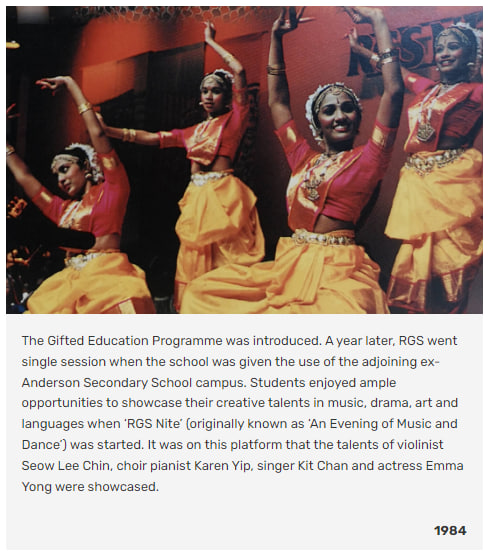
1988
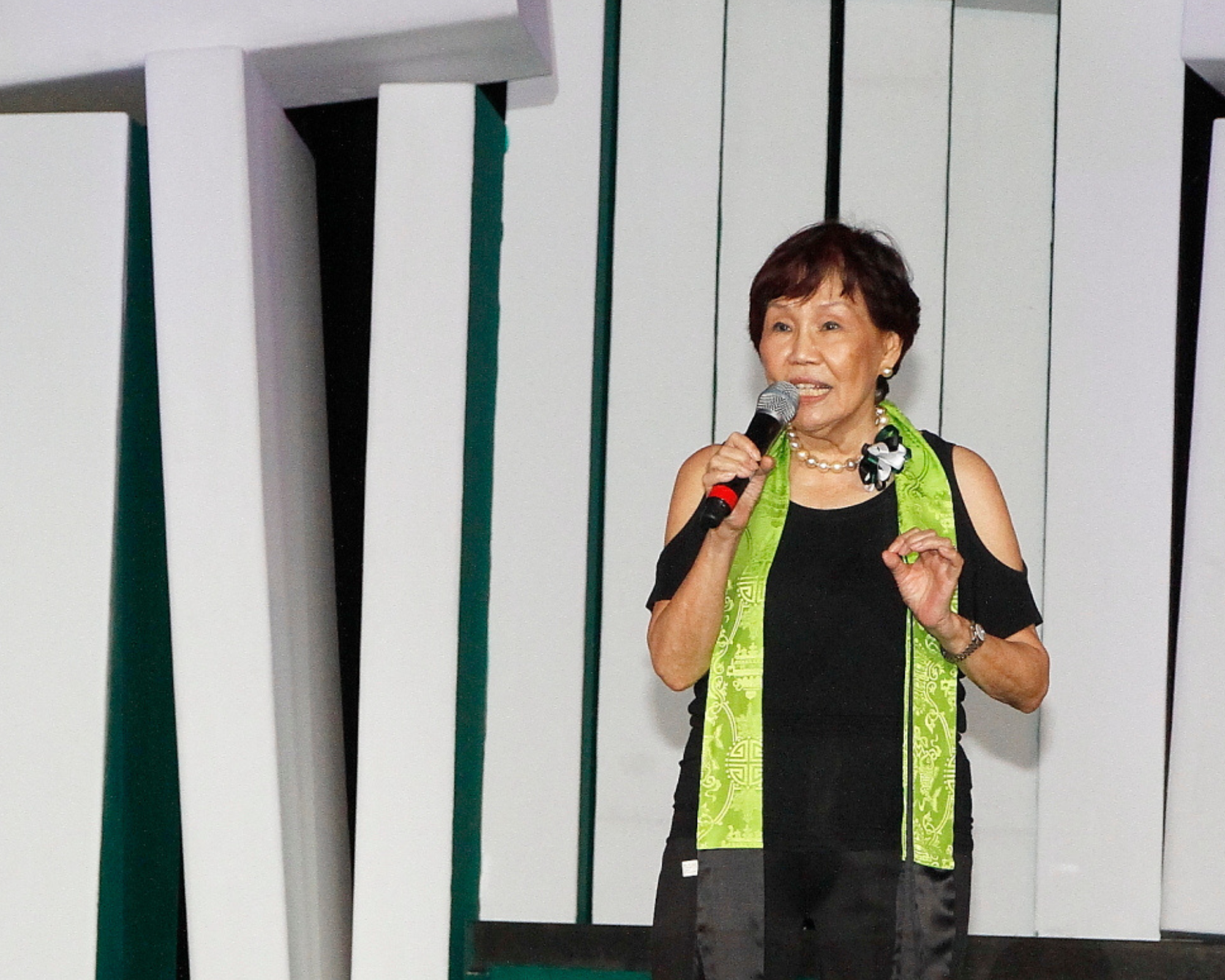
Under Principal Mrs Carmee Lim (1988 – 1999), RGS moved to a holding school located at Jalan Kuala (off River Valley Road) in 1988. A proponent of a multi-pronged approach to education, she championed creativity, innovation and entrepreneurship. Special rooms such as the Humanities Centre and the RGS Guidance Centre were set up.
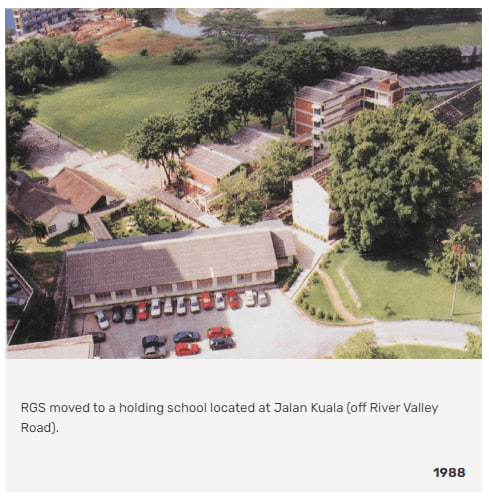
Together with the staff, Mrs Lim came up with the concept of the Living Values known as the four “P’s” – Principled, People-Centred, Passionate and Professional.
To shape RGS into a “School for the Future”, students were exposed to a learning environment that tapped on multimedia technology and a Cyber Learning Centre (which came to be named in her honour) was set up. In 1989, RGS linked up with the University of Michigan in the Interactive Simulation project, which allowed RGS students to exchange ideas with students in six other countries in a “Global Classroom” setting.
1992
RGS moved from its holding school in Jalan Kuala to its original location at Anderson Road on 1 November 1992. 50 girls, carrying a torch and the school flag, took part in the school's bus-stop relay from River Valley Road to Anderson Road.
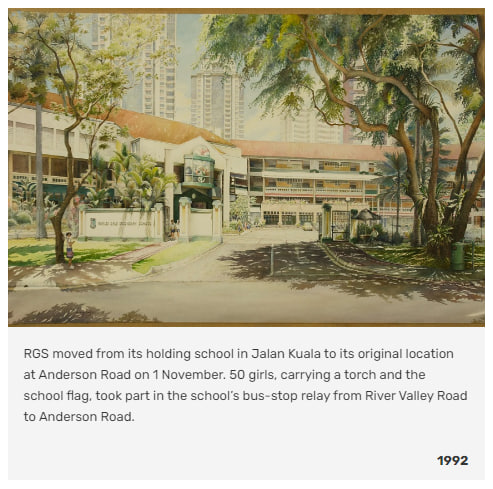
1993
On 1 January 1993, RGS became an Independent School, recruiting her own teachers and introducing innovative enrichment programmes to promote the total development of students and go beyond textbooks.
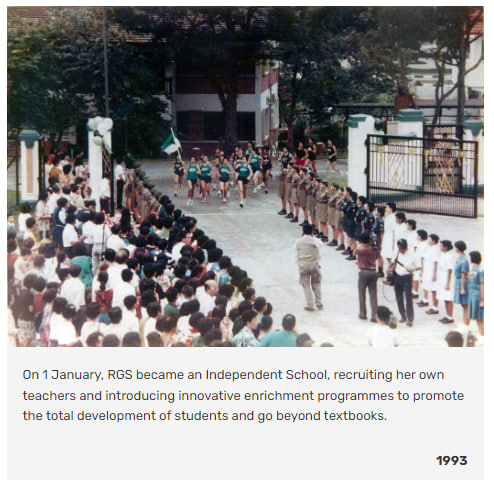
1994
In 1994, the RGS Chapter was formed, to replace the Women's Rafflesian Chapter.
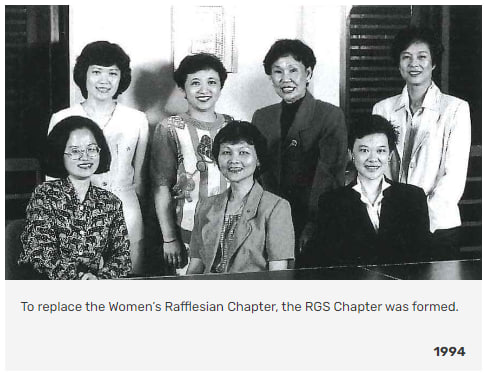
1999
Principal Mrs Deborah Tan (1999 – 2007) played an instrumental role in nurturing the ideals of scholarship in the students. During her tenure, RGS achieved four Sustained Achievement Awards – the only school to do so across the nation at the time.
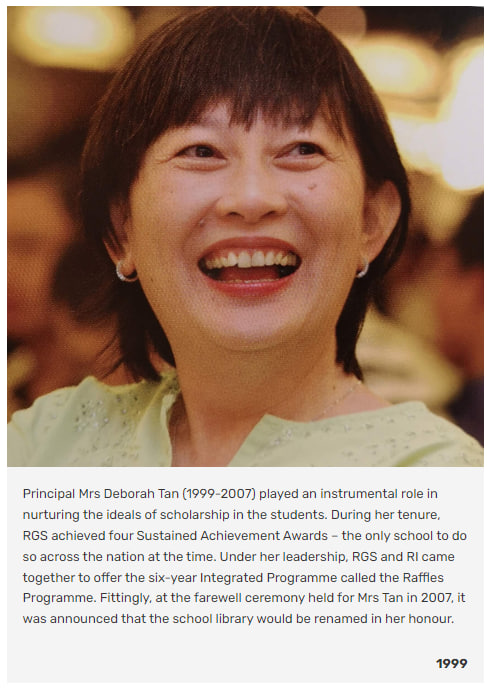
Under her leadership, RGS and RI came together to offer a six-year Integrated Programme (IP) called the Raffles Programme (RP). This was in response to the recommendations for Junior College (JC) Curriculum by the Committee on the Review of JC and Upper Secondary Education, chief among which was to provide for a broader and more flexible curriculum.
2003
Registered as a society in 2003, the key objective of the Parents for RGS Association (PRGS)’ is to connect parents, the school and students, fostering meaningful ties among key stakeholders in the students’ holistic development.
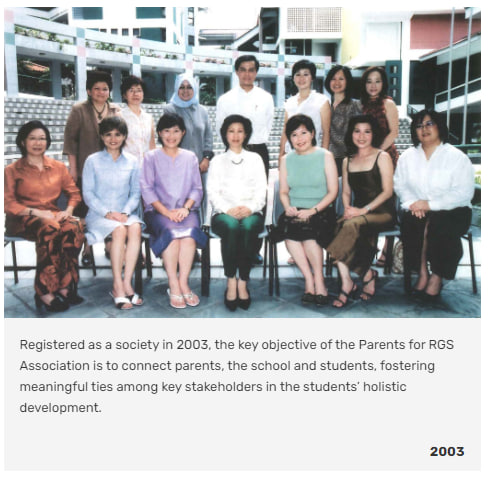
2004
RGS and RI implemented the 6-year Integrated Programme known as the Raffles Programme (RP) in 2004 when Mrs Deborah Tan was Principal. The RP grew out of a strong desire to prepare students for the demands of a fast changing world where they will be expected to lead and serve the community and nation. The RP is consistent with the philosophy of the Raffles schools in delivering a broad-based education that is focussed more on process than mere content. The added emphasis on the co-curriculum is also in line with what the Raffles schools have been well-known for.
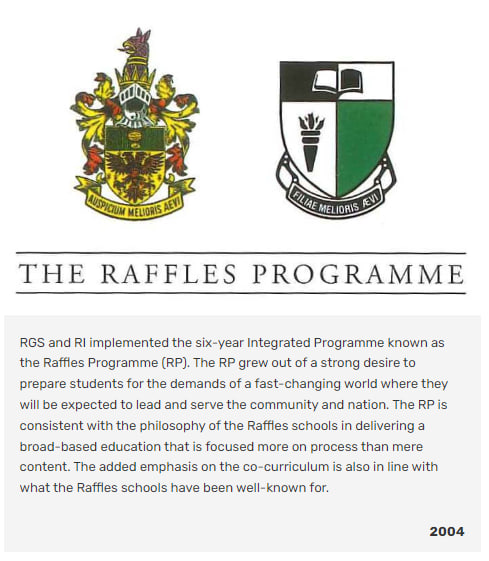
Fittingly, at the farewell ceremony held for Deborah Mrs Tan in 2007, it was announced that the school library would be renamed in her honour.
2007
Principal Mrs Julie Hoo (2007 – 2012) initiated the 1st RGS Homecoming for alumnae as part of the school's anniversary celebrations.
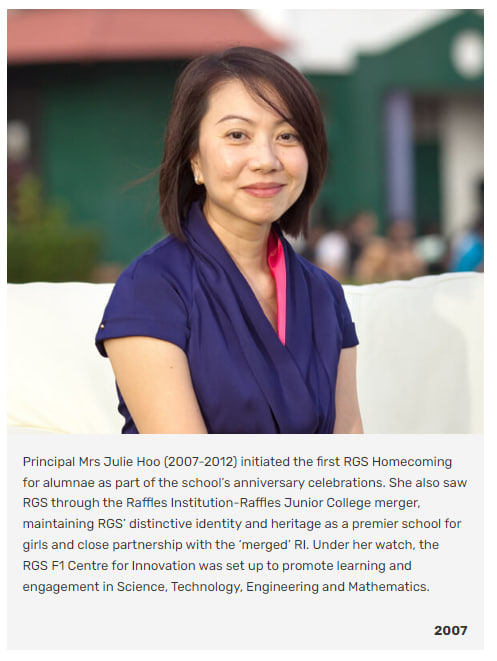
She saw RGS through the Raffles Institution-Raffles Junior College (RI-RJC) merger, maintaining RGS’ distinctive identity and heritage as a premier school for girls and close partnership with the “merged” RI.
Under her watch, the F1 Centre for Innovation - the RGS F1 Centre for Innovation – was set up to promote learning and engagement in Science, Technology, Engineering and Mathematics (STEM).
2009
The Wallace Environmental Learning Laboratory (WELL) was established by RGS and NParks with sponsorship from GlaxoSmithKline and the support of the Economic Development Board. Situated at the Dairy Farm Nature Park, WELL is Singapore’s first and only learning laboratory in the forest.
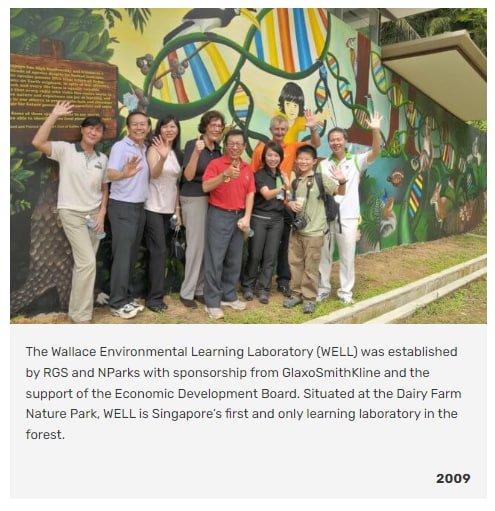
2010
An in-house educational research and consultancy centre was set up with a team of 4 Teacher-Specialists, led by a Director. It was named RGS’ Pedagogical Research Lab.
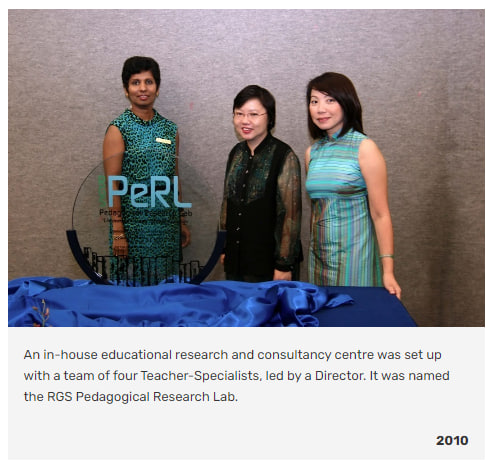
2011
2011 saw the introduction of the 4-year Raffles Diploma (RD) award, which was co-developed with Raffles Institution, to recognise individual talent, encouraging personal responsibility in learning and peaks of excellence.
The RD certification recognises student participation and achievements in five developmental domains: Cognitive, Character and Leadership, Community and Citizenship, Arts and Aesthetics, Sports and Health.
The Regional Studies Programme (RSP) was introduced in RGS to nurture a group of non-Malays comfortably conversant in the Malay Language and able to engage the region.
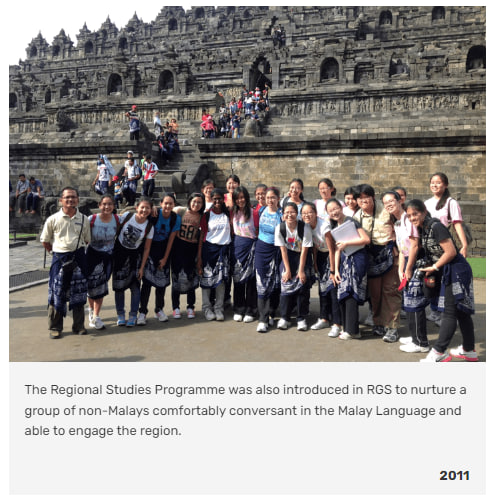
2012
A new campus for RGS was announced. The new RGS campus, to be ready in 2019, will provide the space and facilities required to deliver innovative curriculum and programmes to better support the school’s teaching and learning goals. To be located along Braddell Road opposite RI, the new campus will allow for better planning of schedules for common programmes between the two schools while retaining RGS’ independence and distinctive heritage.
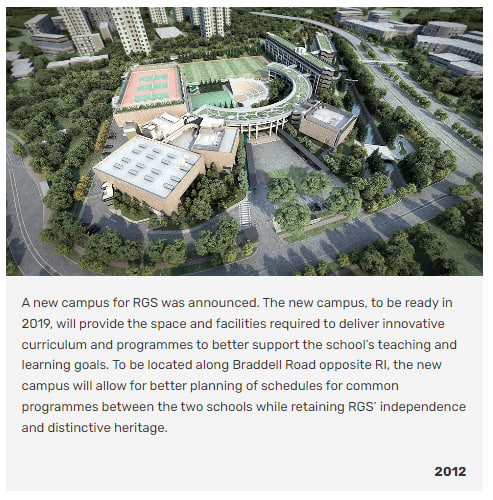
2013
Strategic Envisioning for 2014 – 2018 - in moving the school forward and in light of new challenges within the education landscape, RGS embarked on an envisioning exercise under the watch of Principal Mrs Poh Mun See (Dec 2012 - 2019). RGS Management, in consultation with staff, students and parents and working with a professional consultant, updated the school Strategic Map.
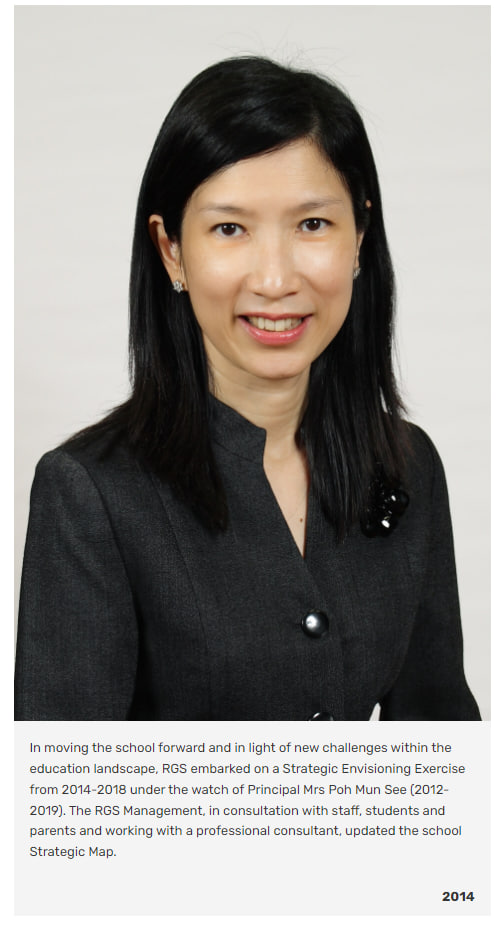
Two large-scale fund-raising events for the New Campus were held in 2013/14 - Launch of “Consuming Passion” cookbook by RGS alumnae with proceeds from the sale of the book going towards the new campus development fund. Guest-of-Honour for the event was former President of Singapore, Mr S R Nathan. The other was the New Campus Fund Raising Banquet held at the Orchard Hotel. Guest- of-Honour for the event was Deputy Prime Minister and Minister for Finance, Mr Tharman Shanmugaratnam.
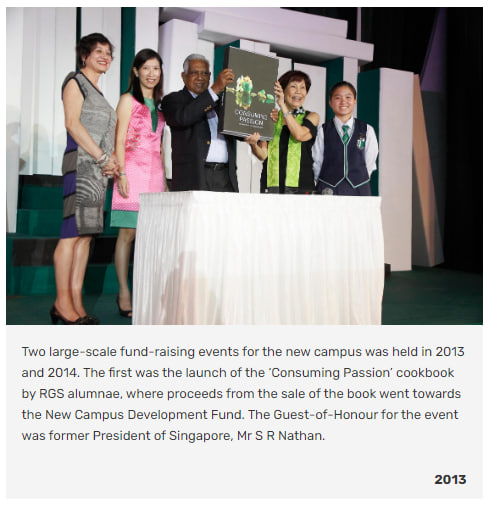
2014
Establishment of the RGS Alumnae - in July 2014, the RGS Alumnae was established as an association for RGS graduates. Its aim is to inspire, enable and engage the alumnae to build a community that embodies the Rafflesian spirit and work towards the betterment of society, nation and self.
To celebrate RGS’ 135th birthday and raise funds for the New Campus, Homecoming III was held in August. It was a day when Rafflesians, past and present, came back to celebrate and to connect with one another over a range of activities that foster bonding across generations of Rafflesians.
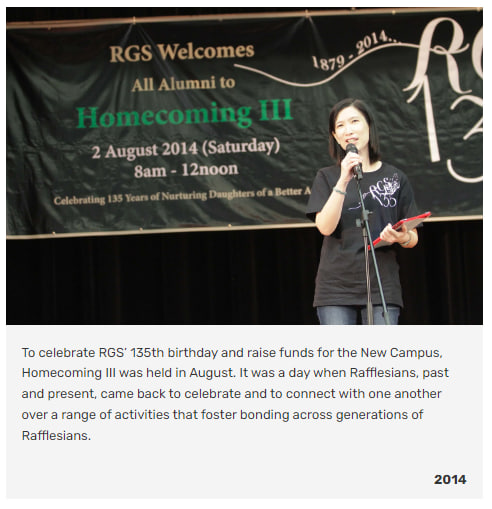
The Pedagogical Research Lab was expanded to incorporate the Teaching track; namely, the Senior and Lead Teachers as well as the Head of Professional Development. It was renamed the Centre for Pedagogical Research and Learning to reflect its growth in Research, Consultancy and Professional Learning.
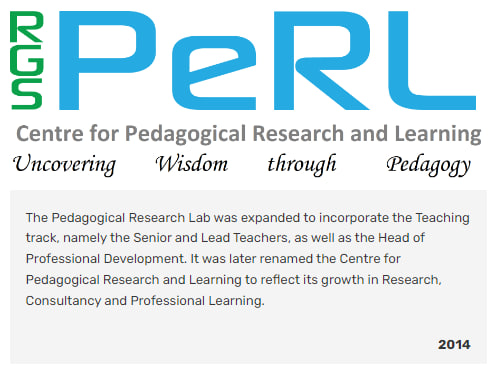
2015
RGS celebrates SG50 - the school held several activities to commemorate Singapore’s Golden Jubilee including a high tea co-organised by the RGS Chapter and RGS Alumnae.
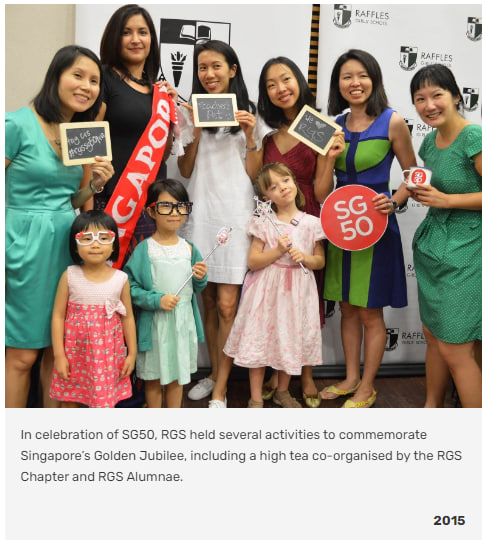
RGS Curriculum Review
A Curriculum Review was conducted to revisit its alignment to the RP goals, values, approaches and features, and to make recommendations for future directions.
2016
School-wide review of RGS’ programmes and resources (2017 – 2021) – in 2016, RGS embarked on a school-wide review of its programmes and resources for the next five years, with particular focus on consolidation and innovation. This was in response to shifts in Singapore society in terms of its priorities and strategies where multiple peaks of excellence and multiple pathways to excellence are encouraged.
2017
Unveiling of RGS New Campus Design - on 17 February 2017, a model of the RGS new campus was unveiled at the Anderson campus. It is designed in such a way as to allow for the optimisation of the Raffles Programme.
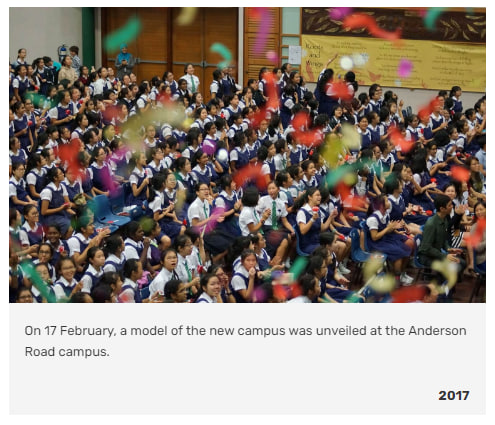
Groundbreaking Ceremony of RGS New Campus@Braddell – the ceremony took place on 12 August 2017. Guest-of-Honour for the event was Dr Amy Khor, Senior Minister of State, Ministry of the Environment and Water Resources, and Ministry of Health. The event marked another milestone in RGS’ 138-year history. In breaking ground for the building of the RGS New Campus, the school is symbolically laying the foundation for RGS to set a new benchmark for learning spaces that is student-focused, environmentally-friendly and inclusive of the community around RGS. This will be RGS’ fifth campus since the school was established in 1879 and will continue the RGS legacy of fostering a healthy balance of academic excellence and sporting prowess.
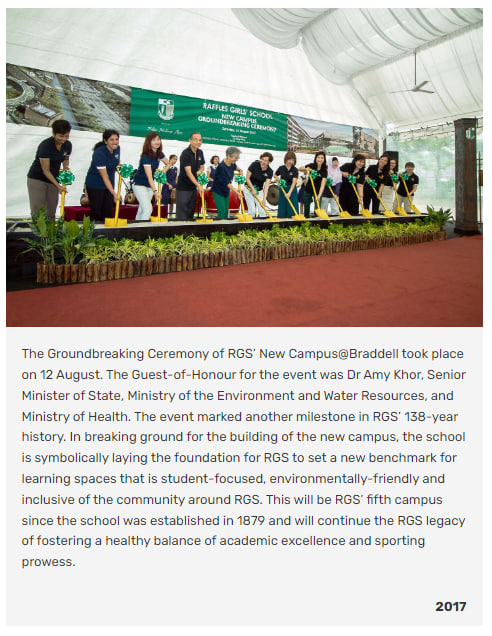
2018
A fundraising event - Carnival Memorias – was held at RGS in March 2018 for the new campus development fund.
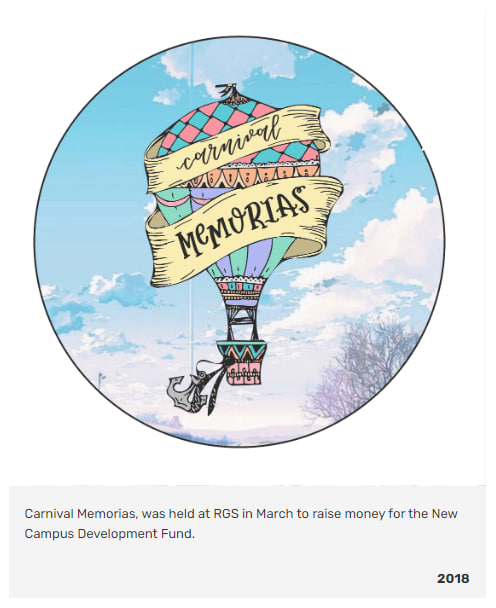
Arising from a school-wide review of RGS’ programmes and resources, Raffles Academy (RA) 2.0, a Talent Development programme, was implemented. Students are able to broaden and/or deepen their learning in a particular area of study through Coursework or Research Modules. This inclusive, opt-in programme combines the best features of three RGS’ instructional programmes to develop in Year 3 and 4 students the fundamental skills and passion for research and creative problem solving (Research Studies), to cater to the many varied interests of these students beyond the academic curriculum (Year 4 Options) and to stretch and challenge students with advanced knowledge and skills in their talent area (Raffles Academy). These modules are taught by RGS teachers as well as industry practitioners and experts in tertiary institutions.
2019
RGS commemorated Singapore’s Bicentennial with a skit on the Founding of Singapore in January; a hall assembly in April reflecting on RGS’ journey over the years; a schoolwide fieldtrip to The Bicentennial Experience @Fort Canning in July and held a “Sixth Statue” Competition in August.
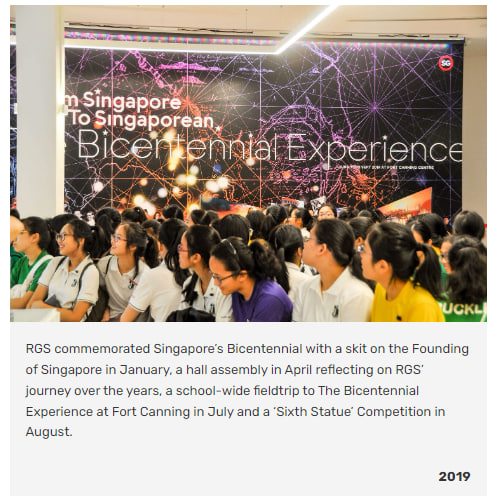
On 17 August, RGS held its 140th Founder’s Day in the morning graced by Guest-of-Honour Ms Chan Lai Fung (Permanent Secretary/National Research & Development).
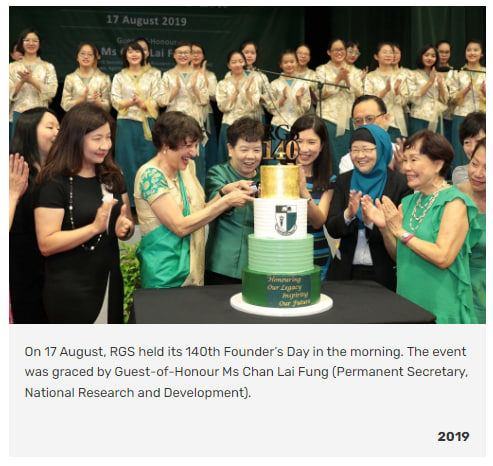
Co-organised with RGS Alumnae, RGS held its Homecoming on the same day which saw 5,000 participants comprising alumnae, current and former staff and students, and well-wishers thronging the Anderson Campus for a grand farewell before the “Big Move”.
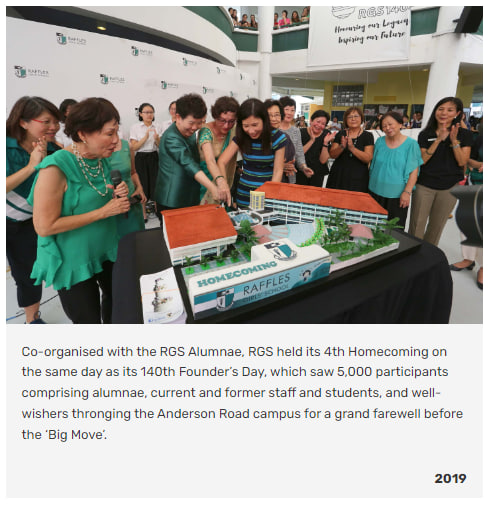
The “Big Move” from Anderson Campus to Braddell Campus was held on 21 October, starting with a “Hopper Bus” journey from Anderson Road to Braddell Rise – a symbolic move with the Principal carrying the RGS flag from the “old’ campus to the “new”. 4 launches took place that day, the launch of the Performing Arts Centre; Innovation Hub; Hong Leong Foundation Filiae Centre; and Triple C Programme.
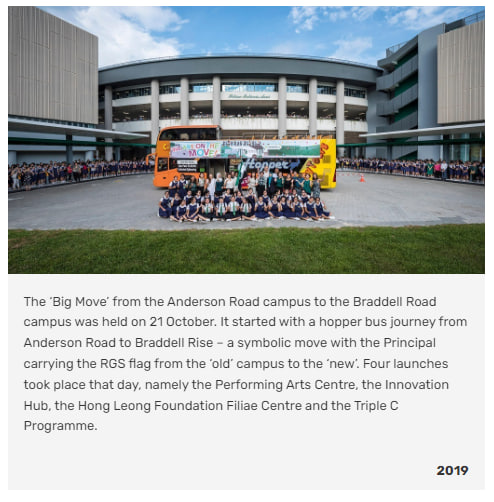
2020
RGS began its academic year in the new campus at Braddell under a new Principal, Ms Haslinda Zamani.
To ensure learning outcomes meet the needs of our students and society in the near and further future, RGS embarked on an envisioning process at the start of the year, involving all members of staff, and included input from alumnae, students and parents.
Arising from the Gifted Education Branch curriculum study report of the Raffles Programme, school efforts gave focus to enhancing enactment of classroom teaching including design of extension learning activities for very high ability learners.
Efforts also went into making the new campus safe and vibrant like a home away from home for students and staff members.
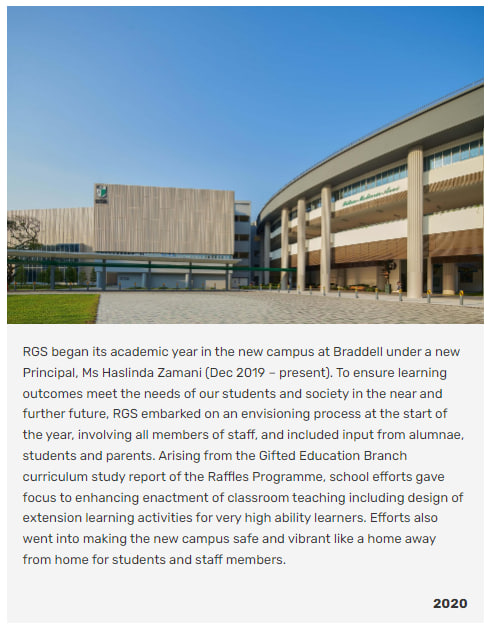
The Covid-19 pandemic helped the school to have a deeper sense of resolve, about the kind of future that we want to build together for RGS. The experience of remote learning, for eg, using online platforms to communicate, to connect, to encourage hearts and minds, have given the school confidence to forge ahead in exploring new ways of learning and working through harnessing the power of technology.
2021
RGS implemented its new five-year Strategy Map with initiatives that support the school’s vision of future learning at RGS.
In February, RGS became the first school in Singapore to roll out the use of iPads for Year One students as part of the National Digital Literacy Programme.
At the start of Term 2, the school embarked on regular fortnightly Home Based Learning for all levels. A research study headed by the RGS PeRL team was launched to help the school better understand how teachers use blended learning to enhance learning opportunities.
In support of RGS’s Digital Curriculum, the Keppel Sandbox was launched at RGS. The Sandbox is a digital makerspace for RGS students to ideate, incubate their ideas, create prototypes and gather feedback as they work on their technological solutions, so that eventually our girls will be able to contribute to and lead in the digital work as confident and empowered young women.
RGS welcomed Justice Mavis Chionh as Chairperson of the School’s Board of Governors, succeeding Justice Judith Prakash who had served for 25 years with dedication and tenacity, leading the school through many milestones.
2022
To promote the capacity for life-long and self-directed learning, which is a central objective of the Personalised Digital Learning Programme, RGS adopted a framework aligning Executive Functioning Skills (EFS) to each phase of Self-Regulated Learning (SRL). Fourteen Executive Functioning Skills were identified and each was categorised in terms of a phase in SRL - Planning, Performance and Self-Reflection.
The school and RI conducted a Raffles Programme Curriculum Review to enhance alignment and continuity of outcomes and standards for Years 1 to 6 in both schools.
RGS continues to give back to the community for eg by participating in the MOE-NLB KidsREAD programme, where upper secondary students read to, and facilitate activities to First Toa Payoh Primary School and New Town Primary School students, so that they can develop an interest in reading. The school also deepened its service to Greenwood Primary school, as two student-teams continued e-reading and math tutoring programmes started in 2020 and 2021, with a third team starting a science tutoring programme this year. Two other teams also deepened their service with Admiralty Primary School and Canberra Primary School, tutoring the students in Math.
2023
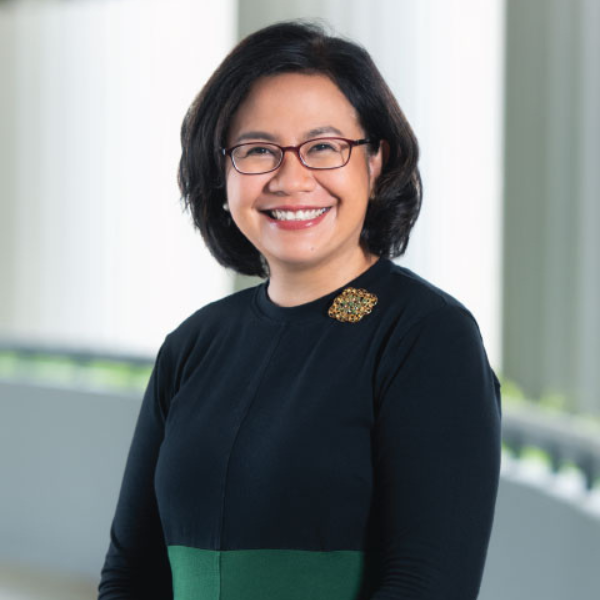
RGS bid farewell to Principal Haslinda Zamani (Dec 2019 to Dec 2023). Under her watch, students were empowered to promote green efforts and co-create the lived physical environment as they make RGS home e.g. Cogitare set up a butterfly garden, and a rooftop Edible Garden sponsored by the Tanoto Foundation was created as an educational hub for sustainable planting and growth, aiming to nurture 'citizen farmers' among RGS staff and students.
Regular reviews were also conducted to ensure timely updates to school rules to enhance student agency, safety and well-being.
Social mixing opportunities and working with community organisations were provided to enable RGS students to engage with their peers and others from diverse background. Over 65 per cent of RGS students have initiated community projects, highlighting their dedication to service.
2024
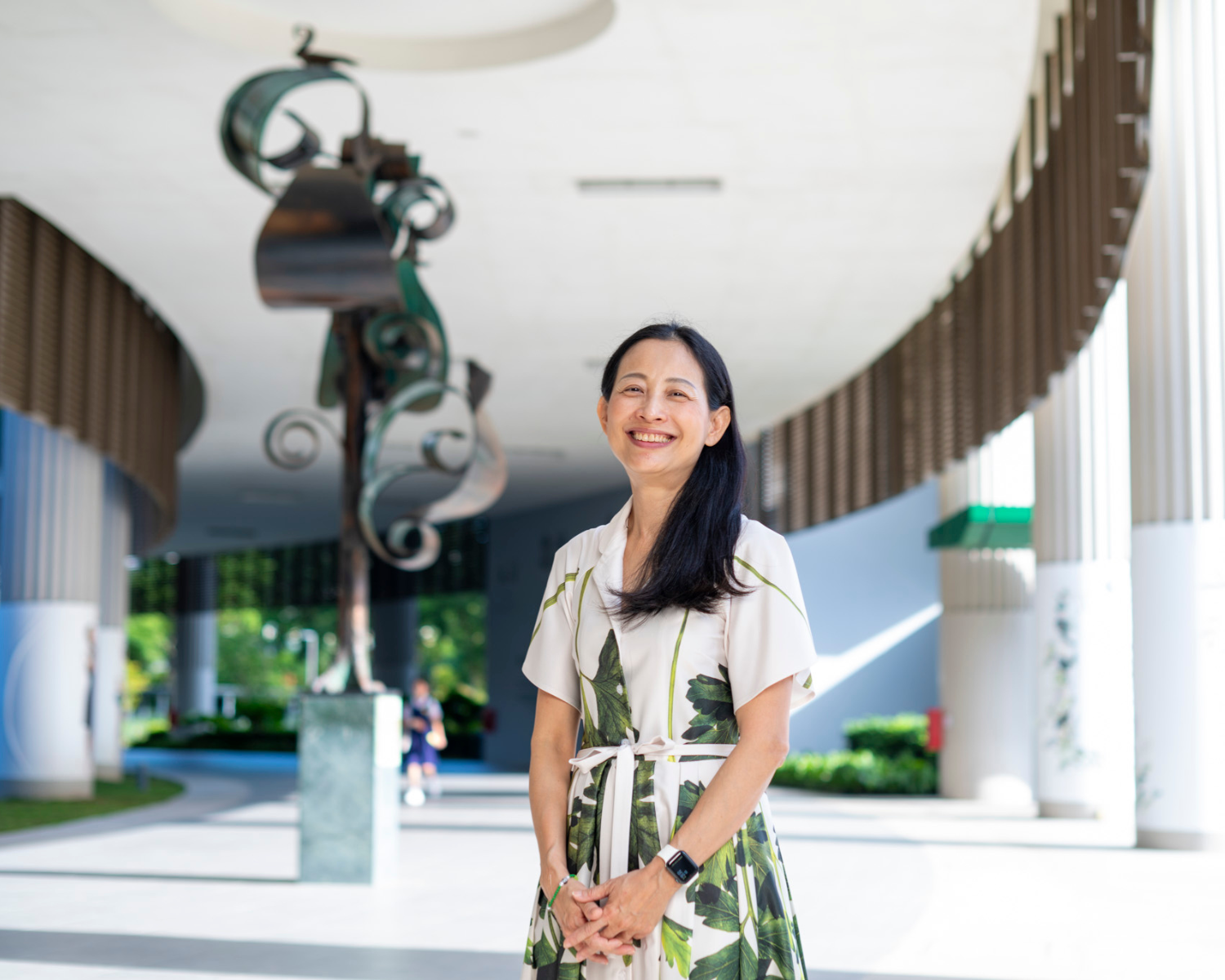
In 2024, RGS welcomed Mrs. Ong Hong Peng as Principal and Ms. Valerie Yeo as Deputy Principal, while bidding a fond farewell to Deputy Principals Ms. Chin Jen Fu and Mrs. Mary George Cheriyan, whose contributions were deeply valued.
A significant shift was introduced for Year 1 students, who now experience a dedicated Foundation Year. This initiative is designed to facilitate their transition from Primary School into the Raffles Programme. To nurture a stronger focus on learning, Year 1 students will not receive Grades or a Grade Point Average (GPA). Instead, the End-of-Year Progress Report will feature Percentage scores complemented by qualitative feedback.
Aligned with the values-driven ethos of the Raffles Programme, subject teachers will also provide qualitative evaluations, highlighting each student’s commitment to learning, as well as their personal and interpersonal effectiveness. This holistic approach underscores the school’s dedication to character development alongside academic growth.
To chart the future of RGS, the school launched its Strategic Planning process with a staff engagement session in November, fostering a collaborative vision for the years ahead.
--
Source: Daughters of A Better Age (Singapore: RGS, 2006) 2nd Edition; The Raffles Wave (various years); RGS Yearbook (various years); RGS Throwback Project (Heritage) team; Raffles Girls’ School (Secondary) Wikipedia

